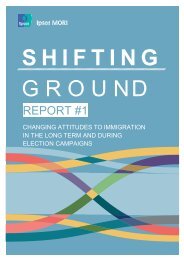You also want an ePaper? Increase the reach of your titles
YUMPU automatically turns print PDFs into web optimized ePapers that Google loves.
Ties <strong>that</strong> Bind<br />
128 Ibid.<br />
129 Ibid.<br />
130 Ibid, p.41<br />
131 Ibid, p.484-5<br />
132 Ibid, p.83<br />
133 Ibid.<br />
134 Ibid.<br />
135 Ibid.<br />
136 Ibid.<br />
137 The War, Moslem feeling:<br />
Part 2 (1914), IOR/L/PS/10/518,<br />
p.15, IOR, BL, London<br />
138 Ibid.<br />
34 | policyexchange.org.uk<br />
‘For, after all, the Mussulmans are not an ungrateful people’, he noted, adding<br />
they would do nothing ‘to embarrass Government at the present juncture’. 128<br />
Again, Kalim’s approach to the dilemma which confronted many Muslim leaders<br />
at the time was to objectively consider the facts of the matter, rather than insisting<br />
Muslim loyalty automatically had to align along confessional lines. His letter also<br />
revealed <strong>that</strong> assurances by the British government regarding the preservation of<br />
Islam’s holy sites assuaged his concerns about the possibility <strong>that</strong> their sanctity<br />
could be violated. 129<br />
Mosques were keen to play their part, too. Government reports showed <strong>that</strong><br />
locals in Upper Burma had received a Union Jack from the Commissioner which<br />
was flown at the mosque throughout the war. 130 Similarly, reports from<br />
Hyderabad revealed <strong>that</strong> special prayers were offered daily for Britain’s success in<br />
the war. 131<br />
It was not only theological considerations <strong>that</strong> moulded Muslim opinion in<br />
favour of the government. A speech by Muslim leaders in Devanhalli, a small town<br />
just outside Bangalore in southern India, also noted the considerable assistance<br />
Britain had offered the Sultan during times of crisis. 132 Indeed, it was held <strong>that</strong><br />
Britain had done so ‘in consideration of the Mussulmans in India’. 133 Among the<br />
examples given were:<br />
? During the Russian-Turkish Crimean War, when Britain helped the Ottoman<br />
government by providing men and money.<br />
? During the Russo-Turkish War, when the Russians reached Constantinople, the<br />
‘help of our benign British turned away the Russians in despair’.<br />
? During the Second Balkan War in 1913, Britain sent financial aid from India<br />
and England to the Ottoman Empire at the request of Indian Muslims. 134<br />
The Devanhalli meeting similarly observed <strong>that</strong> Britain, despite having been<br />
betrayed by the Sultan, had vowed to preserve the sanctity of Islam’s holy sites<br />
– a promise they felt no other government would have made in similar<br />
circumstances. 135 The meeting ended with the recognition <strong>that</strong> Britain treated<br />
Muslims and ensured their rights better than even Muslim governments had<br />
done, something the Devanhalli delegates were keen to acknowledge. They<br />
noted <strong>that</strong> ‘we wish to assure the government <strong>that</strong> the loyalty of the Indian<br />
Mussulmans to the British will not be affected by the present turn of affairs in<br />
the European War. They [Indian Muslims] will not turn their faces away from<br />
this [Britain], the greatest Muhammadan power, under whose shadow they<br />
enjoy the freedom which was denied even by Islamic governments. Our Islam<br />
orders us to be obedient to the reigning sovereign’. 136<br />
Similar sentiments were also expressed by the Moplahs – the name given to<br />
those Muslims in Kerala of mixed Arab and Indian descent. The statement, read<br />
by Bava Haji, noted <strong>that</strong> India had been ruled by the Mughals for almost two<br />
centuries before the British and it is ‘a fact admitted even by Mussulmans <strong>that</strong><br />
during their administration this land was not so peaceful as it is now’. 137 While<br />
acknowledging <strong>that</strong> the Sultan had ‘absolute control in religious matters’, he<br />
reiterated the commonly held opinion within India <strong>that</strong> the Great War was not<br />
a religious conflict and therefore Muslims owed Turkey no special favour. 138<br />
Indeed, Haji warned, ‘any one lacking in devotion and loyalty to the British



